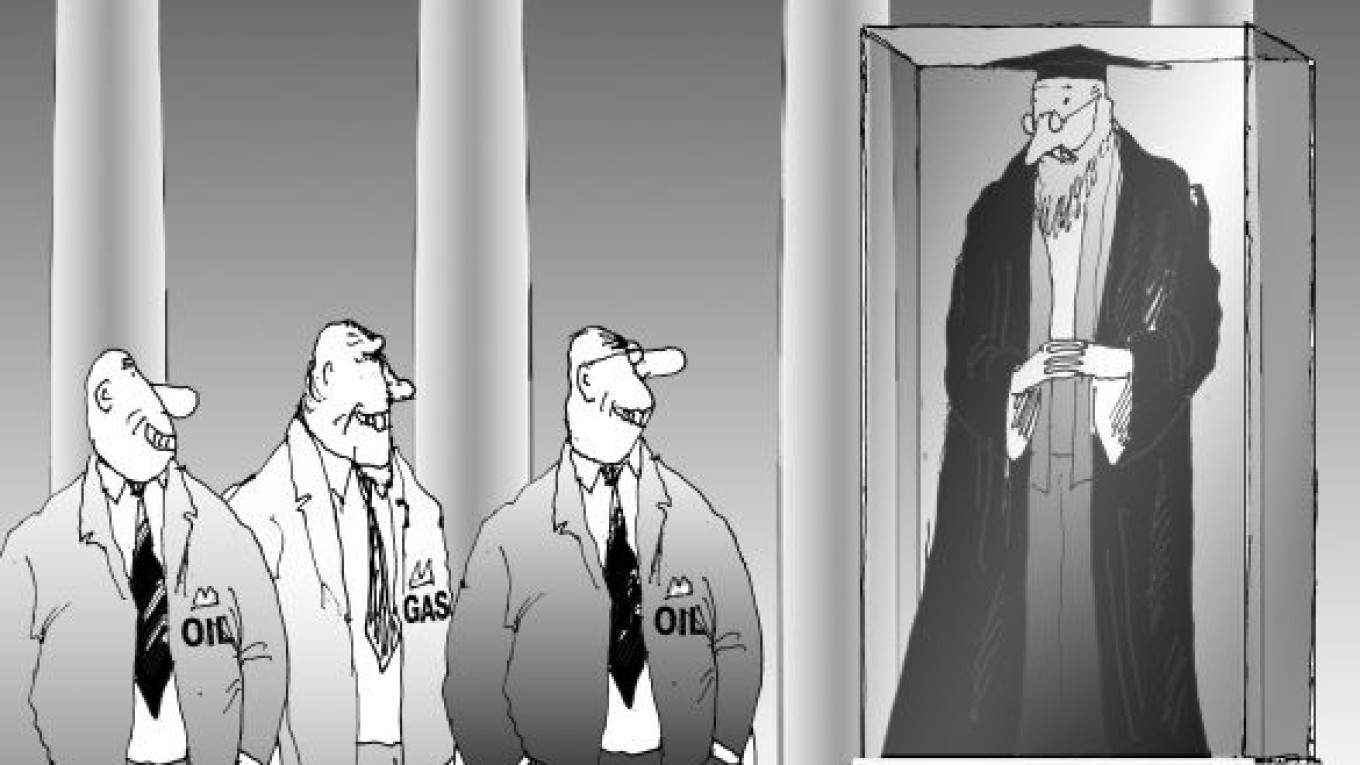It seems that every time Russia’s leaders proclaim an “innovative leap forward,” the West publishes fresh statistics indirectly proving that such a leap is impossible. For example, a recent report on the number of patents registered with the U.S. Patent Office over the last five years shows that Denmark has more than twice as many patents than Russia, Sweden has 6.8 times more, and Canada — 20 times more. What’s more, Germany registers more patents in one year than the Soviet Union and Russia combined over the last half century.
In addition, Russia produces just 2.6 percent of all articles published in international scientific and academic journals, placing it 14th worldwide. It seems that scientific progress is practically at a standstill in Russia, while in leading industrial countries science is taking giant strides forward.
Why is Russia falling so far behind? The standard explanation is inadequate funding. Russia’s 2009 budget for research and development was less than 170 billion rubles ($5.45 billion). By comparison, China allocated $136.2 billion. Russia spends only 0.75 percent of its gross domestic product on scientific R&D, while Japan, Israel, Sweden and many other countries spend more than 3 percent of GDP.
In the rest of the world, scientific achievements are first transformed into manufactured goods before they become a part of the national economy. In no country does the income from the sale of patents and licenses exceed 3.5 percent of total exports. This demonstrates that the driving force for progress is demand from the real sector, which is practically nonexistent in Russia. U.S. companies spend an average of 3.5 percent of their earnings on R&D, and in the European Union that figures averages 3.2 percent. In particular, pharmaceutical companies spend from 13 percent to 16 percent of earnings on R&D, and telecommunications companies — up to 19 percent. In Russia, that indicator does not exceed 0.5 percent, and such national flagship corporations like Gazprom and Rosneft spend no more than a meager 0.17 percent on R&D. Automobile and aircraft manufacturing, shipbuilding and electronics — sectors that drive scientific and technological progress in other countries — are weak in Russia.
The second important factor is the overall deterioration of the country’s education system — not only in the sense that it is underfunded, but also in its loss of prestige. Throughout the 1990s and 2000s, Russia experienced a major brain drain to other countries. At the same time, there has been a sharp rise in the number of university students, while the number of professors has declined. To make matters worse, it is quite easy to simply purchase a “candidate” degree (something roughly between a master’s degree and a Ph.D. in the West) and even a Ph.D. in Russia without actually studying or writing the required dissertations. There are enough artificial holders of these degrees that their overall value has dropped markedly — even for those who earned them honestly.
The third major factor is the closed and fragmented nature of the country’s scientific community. Among member states of the Organization for Economic Cooperation and Development, 22 percent of all scientific articles published are written by an international team of authors. In Russia, that number is less than 1 percent. Foreign professors account for 11 percent to 43 percent of teaching staffs at EU universities and about 9 percent in the United States. In Russia, the number is statistically insignificant. The quality of Russia’s scientific journals is rapidly declining. In Holland, natural science journals have a readership 40 times larger than Russia’s.
Can Russia ever become innovative? Highly unlikely. The government has made superficial attempts to build an “innovation economy” by throwing money at ventures like Rusnano, but little is being done to develop innovation from the bottom up. Moreover, the government is spending much more money on supporting the raw materials sector. This is a clear indication that the state is more interested in maintaining the status quo than developing innovation.
Vladislav Inozemtsev is a professor of economics, director of the Moscow-based Center for Post-Industrial Studies and editor-in-chief of Svobodnaya Mysl.
A Message from The Moscow Times:
Dear readers,
We are facing unprecedented challenges. Russia's Prosecutor General's Office has designated The Moscow Times as an "undesirable" organization, criminalizing our work and putting our staff at risk of prosecution. This follows our earlier unjust labeling as a "foreign agent."
These actions are direct attempts to silence independent journalism in Russia. The authorities claim our work "discredits the decisions of the Russian leadership." We see things differently: we strive to provide accurate, unbiased reporting on Russia.
We, the journalists of The Moscow Times, refuse to be silenced. But to continue our work, we need your help.
Your support, no matter how small, makes a world of difference. If you can, please support us monthly starting from just $2. It's quick to set up, and every contribution makes a significant impact.
By supporting The Moscow Times, you're defending open, independent journalism in the face of repression. Thank you for standing with us.
Remind me later.


